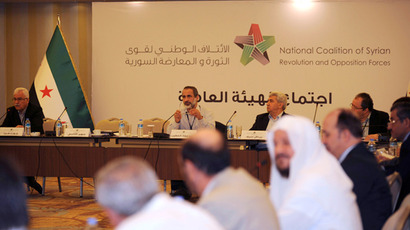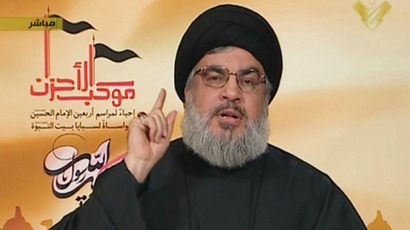Syria claims sarin seizure at rebel hideout as Russia blocks UN's Qusair resolution
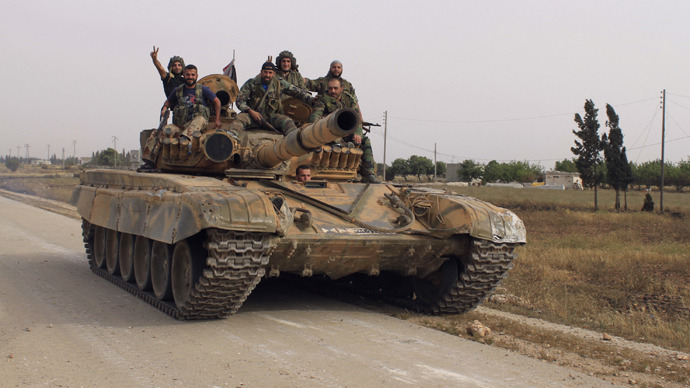
The Syrian Army has seized two containers with poisonous sarin agent in a rebel hideout, SANA said citing sources. Meanwhile, Russia reportedly blocked the UNSC resolution set to slam Damascus’ offensive on the town of Qusair held by opposition forces.
Syrian Arab News Agency reports that sarin, together with automatic rifles, pistols and homemade bombs (IEDs) was seized in the Faraieh neighborhood of the city of Hama.
Sarin (or GB) is an extremely toxic, though colorless and odorless, substance that disrupts the nervous system, over-stimulating muscles and vital organs, if it comes into contact with skin. This potentially extremely harmful nerve agent was originally invented and manufactured to be used as a chemical weapon. According to UN Resolution 687, Sarin is classified as a weapon of mass destruction.
The threat of chemical weapons deployment in Syria has become a major international concern, with American President Barack Obama even saying previously that the use of chemical arsenal by the Syrian government would be a “red line” and might precipitate a foreign military intervention.
However, in early May an independent UN commission came to the conclusion that Syrian rebels had used sarin nerve gas, while allegations of its use by the government have not yet received any official confirmation.
Russia 'blocks' another UNSC resolution on Syria
On Saturday a UN Security Council (UNSC) assembly failed to adopt a British-drafted resolution on the situation in Qusair, which the Syrian Army has blockaded and is said to be eliminating a large group of opposition forces that occupied the town several weeks ago.
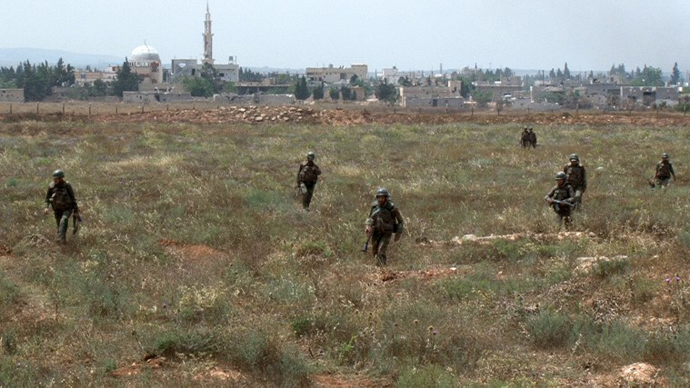
Rebels besieged in Qusair are pleading for military help. They
claim that many civilians have been wounded in the assault of the
government forces and that these people are in desperate need of
medical attention.
The Syrian foreign minister says the country will allow the Red
Cross into Qusair "as soon as military operations are
over," he is cited by Syrian State Television.
The UK-drafted UN statement obtained by Reuters claims that Assad's government must “allow immediate, full and unimpeded access to impartial humanitarian actors, including UN agencies, to reach civilians trapped in Qusair.”
Russia has blocked the resolution during private discussions on
Saturday, explaining that the UNSC had made no statement when the
rebels came to Qusair in force and seized the town.
“Basically there were discussions of a unilateral ceasefire by
the Syrian military and letting armed bandits leave certain
surrounded areas in the city. Such an approach could not be
adopted by Russia. We have expressed our opposition and the
project failed,” Russian Foreign Ministry spokesman Aleksandr
Lukashevich said.
It is “not advisable to speak out as the UN Security Council didn't when Qusair was taken by the opposition,” a Russia diplomat reportedly said in the UNSC.
So far Russia has officially vetoed three resolutions on Syria in
the UNSC saying they were "unbalanced" targeting Assad's
government while sending weak to no message to the opposition
fighters.
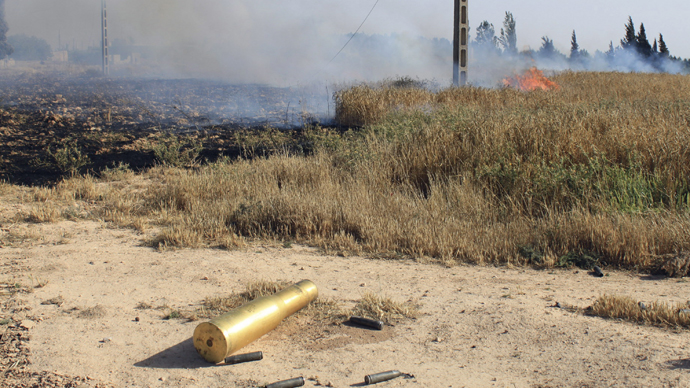
Earlier this week the UN Human Rights Council passed a resolution on the worsening human rights situation in Syria and in particular in connection with battle for Qusair.
The document puts the blame for Qusair violence solely on Damascus troops and condemns the involvement of “foreign combatants” fighting on the side of the Syrian government.
The Russian Foreign Ministry pointed out that the resolution deliberately ignore numerous human rights violations and abuses of Qusair civilians committed by armed foreign jihadists, some of whom have links to Al-Qaeda.
The “foreign combatants” mentioned in the resolution are fighters of the previously neutral Hezbollah group which have joined Syrian military in the offensive on Qusair, overturning the balance in the stand-off to the opposition’s disadvantage.
The Syrian opposition has even threatened not to attend the peace conference in Geneva that is being prepared by Russia and the US for July because of Hezbollah’s involvement.
The ongoing siege of Qusair has raged for two weeks now. On Saturday, UN Secretary-General Ban Ki-moon stated that he is “following with the gravest concern” the situation in Qusair. He reminded the government of Bashar Assad of its responsibility to protect civilians on the Syrian territory, including those threatened by militants, and urged to allow thousands of Qusair residents to flee the town.
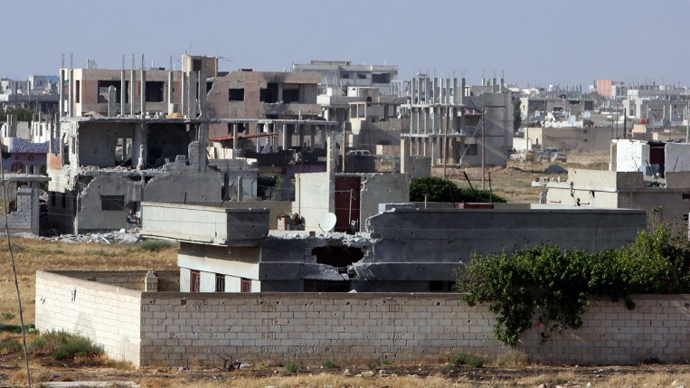
In another statement issued on Saturday the UN Humanitarian Chief Valerie Amos and the UN Human Rights Head Navi Pillay maintained that there are as many as 1,500 injured people in Qusair who need immediate evacuation for emergency medical treatment.
UN officials said that if the information they are receiving is correct, “the general situation in Qusair is desperate.”
“We urge the parties to agree to an immediate ceasefire to allow humanitarian agencies to evacuate the wounded and provide life-saving treatment and supplies,” Amos and Pillay said in their statement.
Qusair, with an original population of 30,000, is less than 10 km from the Lebanese border and some 25 km from the city of Homs.
In the meantime there have been reports of intensifying clashes between the rebel Free Syrian Army (FSA) and Assad’s forces near Aleppo. Allegedly, the troops have captured Mount Shuwaihinah, a dominating point in the area.
FSA brigades are reportedly calling for reinforcements to be sent in from other areas.













